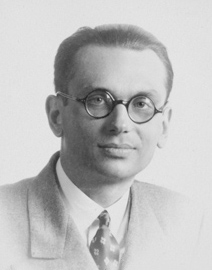Gödel, Kurt

Kurt Gödel was a 20th century Austrian logician. He proved many of the most fundamental results in mathematical logic and set theory, including the Completeness and Incompleteness Theorems and the consistency of the Generalized Continuum Hypothesis and the Axiom of Choice.
Gödel was born in 1906 in the Austro-Hungarian province of Moravia. He finished his doctoral thesis (the completeness theorem) at the University of Vienna in 1929, and commenced work on the incompleteness results while an unpaid lecturer there from 1930 to 1933. During this period he was a frequent participant in the “Vienna Circle,” an informal group of thinkers that included Karl Menger and Rudolph Carnap, among many others. He also came to know the Polish logician Alfred Tarski and the Hungarian mathematician John Von Neumann, both of whom took an avid interest in his work. Gödel first visited the Institute for Advanced Study in Princeton in 1933–34, lecturing on his new incompleteness results. (The institute had just been founded in 1930 with Albert Einstein and Oswald Veblen as its first professors, and soon included Von Neumann, James Alexander, and Hermann Weyl.) Gödel suffered from both depression and exhaustion in the next several years, and spent at least two periods in a sanitarium between 1934 and 1937. He visited the institute again in 1938–39, and then finally, under pressure from the new Nazi regime in Austria, came to the Institute permanently in 1940. Due to the war, this last journey had to be taken through Asia, and required several months. Gödel never returned to Europe.
At the institute, although he joined in a small social circle (and he and Einstein became fast friends), Gödel was very reclusive and never supervised the work of students directly. He was paranoid about his health and about the intentions of others. His most important work in logic and metamathematics was essentially completed by 1940, although he did some interesting work in relativity theory for many years, creating a cosmological model that permitted “time travel” into the past. He wrote prolifically, criticizing the work of Bertrand Russell and others, and promulgating a strong Platonist philosophy of mathematics at a time when Platonism was all but abandoned by most thinkers.
Gödel’s health was poor from 1960 on, and his depressions returned. He developed fears about being poisoned, and would not eat. He died in Princeton Hospital in 1978 of malnutrition.

